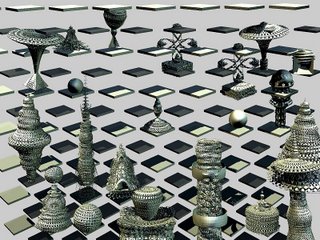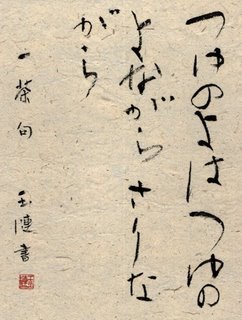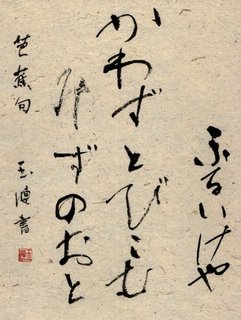
My wife was in Germany (no, not for the football) and came back with a cool chess board pour moi. This set me searching the web for images of chess boards - I really thought there would be some artistic stuff out there, but I must have been looking in the wrong places because I didn't find a lot. I did find a neat fractal though.(see above- Link). There was one other neat pic but it was no longer at the googled website which displayed a haiku instead of the bog standard 404 NOT FOUND. So I googled again and came up with this:-
Haiku error messages
The following has been doing the rounds on the Net, but usually without any attribution.
The haiku were originally the results of a contest run by Salon.com. Not long after they first came out, in February 1998, email versions started circulating. At first they were just unattributed lists of the haiku, but after a while people started embellishing them with the UL that Sony had created these for their Vaio operating system.
Sony has announced its own computer operating system now available on its Vaio PC. Instead of producing the cryptic error messages characteristic of Microsoft's Windows and DOS systems, Sony's chairman Asai Tawara said, "We intend to capture the high ground by putting a human, Japanese face on what has been, until now, an operating system that reflects Western cultural hegemony. For example, we have replaced the impersonal and unhelpful Microsoft error messages with our own Japanese haiku poetry." The chairman went on to give examples of Sony's new error messages:
A file that big? . . . It might be very useful . . . But now it is gone.
You seek a Web site . . . It cannot be located . . . Countless more exist.
Chaos reigns within . . . Stop, reflect, and reboot . . . Order shall return.
Aborted effort . . . Close all that you have worked on . . . You ask way too much.
Yesterday it worked . . . Today it is not working . . . Windows is like that.
First snow, then silence . . . This thousand dollar screen dies . . . So beautifully.
With searching comes loss . . . The presence of absence . . . "JuneSales.doc" not found.
The Tao that is seen . . . Is not the true Tao . . . Until you bring fresh toner.
Windows NT crashed . . . The Blue Screen of Death . . . No one hears your screams.
Stay the patient course . . . Of little worth is your ire . . . The network is down.
A crash reduces . . . Your expensive computer . . . To a simple stone.
Three things are certain . . . Death, taxes, and lost data . . . Guess which has occurred.
You step in the stream . . . But the water has moved on . . . Page not found.
(My personal favourite)
Out of memory . . . We wish to hold the whole sky, . . . But we never will.
Having been erased, . . . The documents you are seeking . . . Must now be retyped.
Serious error . . . All shortcuts have disappeared . . . Screen. Mind. Both are blank.
1. UL=Urban Legend
2. Haiku is a mode of Japanese poetry, the late 19th century revision by Masaoka Shiki of the older hokku, the opening verse of a linked verse form, haikai no renga. A traditional hokku consists of a pattern of approximately 5, 7, and 5 morae. From Wikipedia, the free encyclopedia
Isn't it really educational when you surf!

Issa the Japanese poet was born in a farmhouse in the ancient village of Kashiwabara in 1763, he had a very sad life and finally died in a storage house 1827. His full name was Kobayashi Tataro, which he used until he started writing serious poetry. At that time he changed his name to Issa.
When he was fifty he married a twenty-eight year old woman with whom he had five children. However, all of these children died. When the last one, a little girl died, he wrote,
Tsuyu no yo wa
tsuyu no yo nagara
sari nagara.
World like a dewdrop
though it's only a dewdrop
even so, even so.
Basho (bah-shoh), pseudonym of Matsuo Munefusa (1644-94), Japanese poet, considered the finest writer of Japanese haiku during the formative years of the genre. Born into a samurai family prominent among nobility, Basho rejected that world and became a wanderer, studying Zen, history, and classical Chinese poetry, living in apparently blissful poverty under a modest patronage and from donations by his many students. From 1667 he lived in Edo (now Tokyo), where he began to compose haiku.
Furu ike ya
kawazu tobikomu
mizu no oto
Old pond!
frog jumps in
water’s sound
Just thought this up:
Chess board
Queen mates King
then silence!


